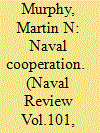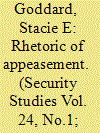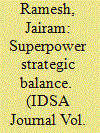| Srl | Item |
| 1 |
ID:
123120


|
|
|
|
|
| Publication |
2013.
|
| Summary/Abstract |
Significant nuclear reductions by the United States can affect other states in one of five ways: by directly altering their strategic calculations and postures; by indirectly altering their strategic calculations and postures by affecting the behavior of third-party states; by undermining formal US deterrence commitments; by eroding the United States's perceived ability to provide "informal" deterrence through the maintenance of an active global presence; and by creating normative pressure for states to emulate US nuclear reductions. Only the erosion of "informal" deterrence is likely to affect South Asia; to the extent that significant US nuclear reductions affect South Asia, then, their impact is likely to be destabilizing.
|
|
|
|
|
|
|
|
|
|
|
|
|
|
|
|
| 2 |
ID:
128667


|
|
|
|
|
| Publication |
2013.
|
| Summary/Abstract |
The author, a senior fellow of the Atlantic Council in Washington, DC and vising fellow at the Corbett centre for Maritime Policy studies, King's college, London, examines the idea of cooperation between the Anglophone navies to compensate for the declining strength of each of theme individually. He looks beyond comforting language about cooperation to what it might mean on the ground in real in real material terms. An earlier version of this article was published by the Atlantic Council and Rusi in September 2012.
In the unrelenting struggle of peoples, those ascendant at sea have, at least in the modern era, proved consistently successful either singly or in alliance against those with a territorial power base- Peter Padfield.
|
|
|
|
|
|
|
|
|
|
|
|
|
|
|
|
| 3 |
ID:
100800


|
|
|
| 4 |
ID:
064573


|
|
|
| 5 |
ID:
162939


|
|
|
| 6 |
ID:
138852


|
|
|
|
|
| Summary/Abstract |
Few grand strategies have been more scrutinized than Britain’s decision to appease Nazi Germany. From 1933 to 1938, Britain eschewed confrontation and attempted to settle German demands. However in the five months following the negotiations at Munich, the British abandoned appeasement and embraced a policy of confronting the German state. The roots of both appeasement and confrontation can be found in Germany’s legitimation strategies. Until the Munich crisis, Adolf Hitler justified Germany’s aims with appeals to collective security, equality, and self-determination—norms central to the European system established by the Treaty of Versailles. After Munich, in contrast, German politicians abandoned these legitimation strategies, arguing instead that expansion was justified as a matter of German might, and not international rights. As Britain came to see German demands as illegitimate, so too did they decide this revisionist state was insatiable, impervious to negotiation, and responsive only to the language of force.
|
|
|
|
|
|
|
|
|
|
|
|
|
|
|
|
| 7 |
ID:
179452


|
|
|
| 8 |
ID:
184917


|
|
|